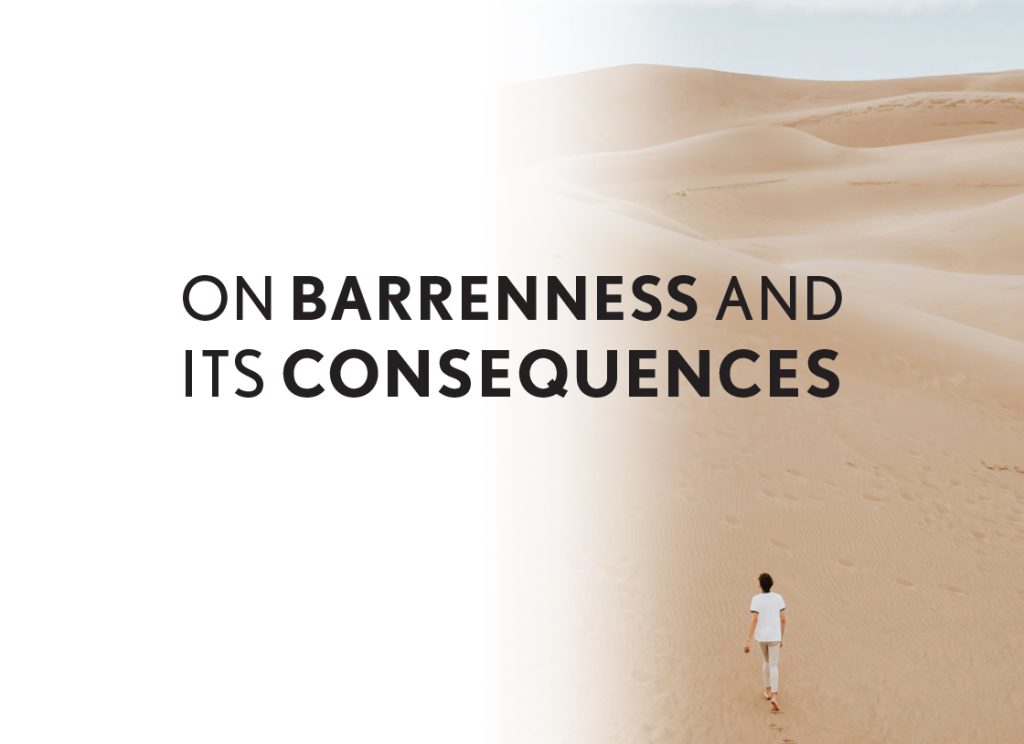On Barrenness and its Consequences

Thus says the Lord:
“A voice is heard in Ramah,
lamentation and bitter weeping.
Rachel is weeping for her children;
she refuses to be comforted for her children,
because they are no more.”
– Jeremiah 31:15
There is a quiet, yet widespread dilemma afflicting North American culture and, therefore, our congregations. Birth rates have stagnated. One study suggests that five percent of women do not want children. But another recent study by Cardus suggests that more than fifty percent of Canadian women aged 44 and under have fewer children than they want.
Sadly, a significant percentage of these will remain childless—unwillingly. It’s a sorrow that has touched my own family, as well as those of my friends. This is a terrible burden for wives and husbands to bear, and one that is borne often in silence. The ramifications are truly painful: birthdays never celebrated, parents who never become grandparents, family lines that leave no legacy, congregations that do not grow, and a generation of believers that are missing from our midst.
Barrenness is a monster that attacks via a multitude of avenues. In some cases, barrenness occurs through the tragedy of miscarriage—in some cases, repeated miscarriage. Others go through the harrowing experience of stillbirth. Still others are afflicted with barrenness, and of that about a third are afflicted with barrenness with no clear underlying medical cause.
This reality leads us to a particularly hard biblical text. On the way to His crucifixion, Jesus says these words to the women who weep for Him: “Daughters of Jerusalem, do not weep for Me, but weep for yourselves and for your children. For behold, the days are coming when they will say, ‘Blessed are the barren and the wombs that never bore and the breasts that never nursed!’ Then they will begin to say to the mountains, ‘Fall on us,’ and to the hills, ‘Cover us.’ For if they do these things when the wood is green, what will happen when it is dry?” (Luke 23:28-31).
I do not like this text. But our Lord has said it, so I need to reckon with it. The problem is with me, not the words of Jesus. This text is easier to understand in times of great global crisis, such as pandemic, warfare, social unrest, and economic uncertainty. It is, in fact, easier not to have to navigate children through the multifarious malign influences in the world that are extant today. This, however, is the coldest of comforts to grieving potential parents—but it is comfort, nonetheless.
The struggle of barrenness forces husbands and wives to find contentment in the bonds of marriage. It also forces them to find joy in nieces and nephews, and to be a support to family and friends who are blessed with children. This is not an easy conclusion to arrive at nor are these always easy actions to undertake. However, the duties of these other vocations are clear, and we are called to the fulfillment of these duties to the best of our God-given abilities.
Barrenness is a consequence of the Fall into sin. It is my growing contention that, when God tells Eve that she will bring forth children in pain, He is not only referring to the pains of pregnancy and labour, but also the physical, emotional, and spiritual pain of a body that will not or cannot do what it is designed to do: bring forth children.
Barrenness is a consequence of the Fall into sin. It is my growing contention that, when God tells Eve that she will bring forth children in pain, He is not only referring to the pains of pregnancy and labour, but also the physical, emotional, and spiritual pain of a body that will not or cannot do what it is designed to do: bring forth children.
Medical intervention to overcome barrenness is sometimes effective—but only sometimes. Only thirty percent of all in vitro fertilization (IVF) sessions result in a pregnancy. And the toll it takes on the body of the wife, and—depending on the circumstances—the husband as well can be brutal. And this assumes that a clinic will abide by the patients’ personal morality of only fertilizing as many eggs as are going to be transplanted.
The tragedy of infertility throws the wider crisis of declining birth rates into stark relief. To be sure, there is plenty of blame to go around. Yet this crisis—like all crises—is also for us a call to repentance. Repentance for our own anti-family and anti-life views. Repentance for the growing commodification of children through the fertility industry. Repentance for our refusal to stand up to the abortion industry. Repentance for our refusal to call out the adoption industry for their arduous rules, regulations, and costs. It is a call to repentance, in short, not only for our thoughts and the worldviews which we have accepted but also for our actions which have been born of these thoughts and worldviews.

Sorrow of this nature is a call to repentance. We see in the book of Revelation that, when our Lord breaks the seals and calls forth the horsemen of War, Conquest, Famine, and Death, He does so with the intention that His people, indeed that all people, would repent. Yet in Revelation, the people do not repent. Let it not be so for us! In the face of barrenness in our lives, in our families, and in our congregations, we need to repent, receive the Sacraments, and be forgiven.
The damage which barrenness causes to individuals and marriages should teach us to refuse a world that celebrates careers and hobbies more than anything else. The affliction of infertility should give us pause as we look at a world that openly hates the biblical family, and consider that the world is dead wrong in its priorities.
Barrenness is truly a crisis, and a cruel one at that. Conducting funerals for the unborn, the miscarried, and stillborn is a terrible experience. Yet where else can a person turn? Only to Christ and His mercy, our Lord who has overcome sin and death.
And thanks be to God that our Lutheran doctrine of vocation rightly prioritizes the spousal relationship in a family before the parental relationship. Even for families with children, mother and father are obligated first to love each other as a way of ensuring a stable environment in which children may be raised. The relationship between mother and father also provides a model for children to emulate as they grow and one day marry. This essential priority of husband and wife in the family is a comfort to those facing infertility. It is a reminder that God has given the husband and wife to each other as a gift—and for support through better and worse, through sickness and health.
We must always fix our eyes on our crucified Lord, who died not only for original sin (which is the root cause of the curse of barrenness) but also for the committed sins that are sometimes a factor in barrenness. And we look forward to the Last Day where the curse will no longer afflict us and our bodies—the promise of eternity in which we will be given by God our risen and perfected bodies.
If you are afflicted with miscarriage, stillbirth, or barrenness, reach out to your pastor. He longs to share the comforting Words of Christ with you. He will pray with you and for you. He will give you the Sacraments, so that your faith can be strengthened in the midst of this terrible affliction.
Amen. Come quickly, Lord Jesus!
———————
Note: Barrenness is a grief which some couples choose to share with only a small group of family, friends, and pastor—not because it is anything to be ashamed about but because the grief can be deeply personal in nature. In order to preserve the privacy of the author and their family, and at the author’s request, we have not included a byline with this article.





